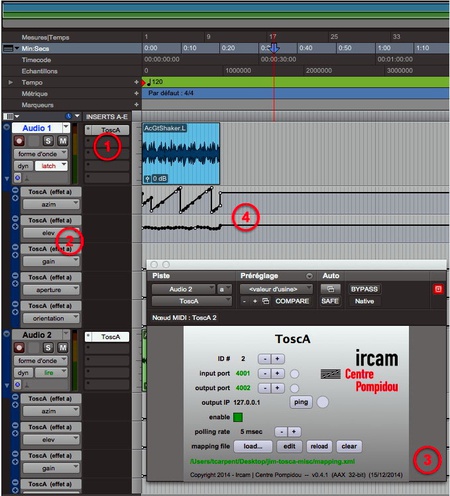ToscA
ToscA est un plugin permettant de communiquer, en lecture comme en écriture, l’automation des paramètres d’une station de travail audionumérique vers d’autres applications, via le protocole OSC. Son application typique concerne la réalisation de mixages spatialisés orientés objet, indépendamment des contraintes des logiciels hôtes.
Fonctions principales
 ToscA s’insère en tant que plugin audio dans le DAW (Digital Audio Workstation, environnement de montage/mixage), sur chacune des pistes à spatialiser. ToscA n’affecte aucunement le signal audio qui est simplement court-circuité ; en revanche le plugin expose un certain nombre de paramètres automatisables. Dans un souci de compatibilité avec une vaste gamme de stations audionumériques, le nombre maximal de paramètres exposés par piste est limité à 32. Lorsque ces pistes d’automation sont activées en lecture, ToscA envoie les données de ces pistes en OSC. De même, si les automations sont armées en écriture, ToscA peut recevoir des paquets OSC depuis une application distante, et inscrire ces données dans les pistes du DAW.
ToscA s’insère en tant que plugin audio dans le DAW (Digital Audio Workstation, environnement de montage/mixage), sur chacune des pistes à spatialiser. ToscA n’affecte aucunement le signal audio qui est simplement court-circuité ; en revanche le plugin expose un certain nombre de paramètres automatisables. Dans un souci de compatibilité avec une vaste gamme de stations audionumériques, le nombre maximal de paramètres exposés par piste est limité à 32. Lorsque ces pistes d’automation sont activées en lecture, ToscA envoie les données de ces pistes en OSC. De même, si les automations sont armées en écriture, ToscA peut recevoir des paquets OSC depuis une application distante, et inscrire ces données dans les pistes du DAW.
Chaque instance de ToscA possède un identifiant (ID) qui est réglable par l’utilisateur. Cet identifiant constitue la racine des messages OSC émis/reçus par ToscA. Leur syntaxe prend la forme suivante : « /ID/NomParamètre ValeurParamètre » par exemple : « /3/azimuth 135.0 ». Dans un souci de simplicité, les paramètres dans ToscA sont tous des nombres flottants en double précision. Les autres types de données possiblement encapsulables dans un paquet OSC (tels que nombres entiers, chaînes de charactères, etc.) ne sont actuellement pas gérés.
ToscA n’est pas lié à un moteur de spatialisation ou de synthèse en particulier; autrement dit, les paramètres d’automation qu’il expose sont génériques. Par défaut, ces 32 paramètres se nomment param1, param2, etc. Le libellé des paramètres peut ensuite être configuré. Ceci se fait par le biais d’un fichier de configuration (fichier dit de mapping) au format XML qui doit être chargé dans ToscA. (cf. figure). Le fichier XML de configuration permet de spécifier, pour chacun des paramètres, une mise à l’échelle des valeurs d’automation : dans l’environnement du DAW, les pistes d’automation sont codées en flottant sur [0 – 1] ; ToscA réalise une mise à l’échelle de [0 – 1] vers le domaine [min – max] choisi par l’utilisateur. Cette mise à l’échelle affecte les données sortantes et l’opération inverse est appliquée aux données entrantes.
Configuration
ToscA a été développé avec le framework Juce. Juce offre un wrapper de plugin qui permet, à partir d’une base de code commune, de générer des plugins dans différents formats (VST, AudioUnits, etc.). Ainsi, ToscA est disponible sous MacOS et Windows, en format VST, VST3, AU, AAX, en mode 32 ou 64 bit. Il est distribué via le Forum Ircam.
Image : Vue du plugin ToscA dans ProTools et fichier d’exemple de configuration des paramètres d’automation. 1. Plugin en insert sur la piste 1 - 2. Liste des paramètres exposés - 3. Fenêtre du plugin - 4. Pistes d’automation